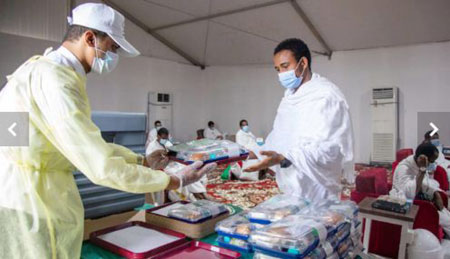Some 195 catering companies and kitchen owners approved by Makkah’s municipality are expected to provide around 4.8 million meals per day to pilgrims during the Hajj season this year.
The official spokesman of the Makkah municipality, Osama bin Abdullah Al-Zaytouni, said that the city had approved several food and beverage providers. He pointed out that further requests from catering contractors looking to provide their services during the season are welcome after they fulfill the municipality’s quality requirements.
Al-Zaytouni said that the stringent approval process is part of the secretariat’s keenness to provide the “safest and healthiest” food to pilgrims.
As such, Makkah’s municipality has created a program to follow up with the catering service providers for Hajj according to their standards and requirements to determine each caterer’s operational capacities.
Teams of technicians and laboratory specialists will be dispatched to conduct continuous field inspections of facilities. Over 100 specialists will analyze food samples and check on the quality of materials used, such as frying oils, hygiene materials and the safety of the cooking equipment used. Workers will also issue training and awareness to the catering providers.
Al-Zaytouni said that the first step of providing meals begins with a careful preparation process involving storing the meals in designated cold rooms and freezers. Defrosting meals and preparing them will be done by heating the meals using electric ovens with particular specifications and will be followed by transporting the food in refrigerators in preparation for distribution to pilgrims at the camps. All of these stages will be monitored closely by the dispatched teams.
The municipality said its food quality efforts are part of its plans to achieve the highest level of services provided to pilgrims so they can be comfortable and perform their rituals in a safe and spiritual atmosphere.—AN










